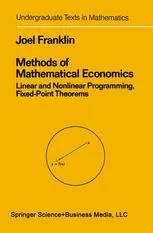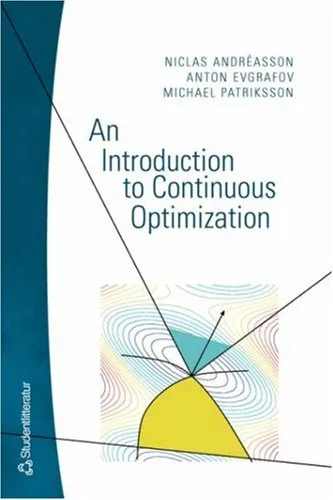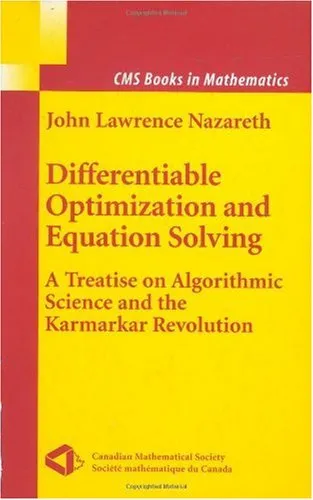Methods of Mathematical Economics: Linear and Nonlinear Programming, Fixed-Point Theorems
4.5
بر اساس نظر کاربران

شما میتونید سوالاتتون در باره کتاب رو از هوش مصنوعیش بعد از ورود بپرسید
هر دانلود یا پرسش از هوش مصنوعی 2 امتیاز لازم دارد، برای بدست آوردن امتیاز رایگان، به صفحه ی راهنمای امتیازات سر بزنید و یک سری کار ارزشمند انجام بدینکتاب های مرتبط:
معرفی کتاب
کتاب 'Methods of Mathematical Economics: Linear and Nonlinear Programming, Fixed-Point Theorems' تالیف جوئل فرانکلین به عنوان یکی از منابع معتبر در زمینه اقتصاد ریاضی شناخته میشود که به بررسی روشهای برنامهریزی خطی و غیرخطی و اصول قضایای نقطه ثابت میپردازد.
خلاصهای از کتاب
این کتاب در اصل ابزاری است برای افزایش درک دانشپژوهان از مفاهیم اقتصادی به کمک ریاضیات پیشرفته. کتاب به سه بخش عمده تقسیم میشود: برنامهریزی خطی، برنامهریزی غیرخطی، و قضایای نقطه ثابت. هر بخش به صورت جداگانه به نظریهها و کاربردهای هر روش اختصاص یافته است، همراه با مثالهای متعدد و جزییات فنی که خواننده را در درک بهتر و بکارگیری این مفاهیم راهنمایی میکند.
نکات کلیدی
- بررسی جامع مفاهیم برنامهریزی خطی و کاربردهای آن در اقتصاد.
- پرداختن به پیچیدگیهای برنامهریزی غیرخطی و چگونگی حل آنها.
- توضیحاتی دقیق درباره قضایای نقطه ثابت و اهمیت آنها در تحلیلهای اقتصادی.
- مثالهای عملی و قابل پیادهسازی که یادگیری مفاهیم را تسهیل میکند.
جملات مشهور از کتاب
جوئل فرانکلین در این کتاب جملات تأثیرگذاری دارد که عمق دانش و تجربه او را نشان میدهد. برخی از این جملات بینشی عمیق درباره تعامل ریاضیات و علوم اقتصادی ارائه میدهند. متأسفانه به علت محدودیت فضا نمیتوان به تمام آنها اشاره کرد، اما توصیه میشود که خواننده با دقت به این جملات توجه داشته باشد.
چرا این کتاب مهم است
اهمیت 'Methods of Mathematical Economics' در این است که نه تنها به توضیح دقیق مفاهیم انتزاعی اقتصادی میپردازد، بلکه نحوه بکارگیری عملی این مفاهیم در مسائل واقعی را نیز نشان میدهد. ابزارهایی که در این کتاب معرفی میشوند، برای پژوهشگران اقتصاد، ریاضیدانان، و همچنین برای افرادی که به دنبال کاربردهای ریاضیات در مدلسازی اقتصادی هستند، به شدت ارزشمند است. از دیگر نکات مهم، تأکید کتاب بر توسعه مهارتهای تحلیل و تفکر نقادانه است که در تمامی زمینههای حرفهای اقتصادی کاربرد دارد.
Introduction to "Methods of Mathematical Economics: Linear and Nonlinear Programming, Fixed-Point Theorems"
Welcome to a journey through the fundamental techniques that govern the realm of mathematical economics. This book serves as a comprehensive guide to essential tools such as linear and nonlinear programming and fixed-point theorems, which are pivotal in understanding and formulating economic models.
Detailed Summary
In today’s complex economic landscape, mathematical methods provide critical insights and solutions. This book focuses on the core methodologies that underlie modern economic theory. The exploration begins with linear programming, which is foundational for optimizing resources in economic models. As we delve deeper, nonlinear programming is introduced, offering an advanced view of scenarios where linear assumptions do not suffice.
Furthermore, the book discusses fixed-point theorems, which play a significant role in equilibrium analysis—a cornerstone of economic theory. By presenting these mathematical techniques, the book equips readers with the tools to solve real-world economic problems effectively.
Key Takeaways
Readers will gain a robust understanding of:
- The principles of linear programming and its economic applications.
- Advanced problem-solving skills in nonlinear programming and its significance in complex economic models.
- The role of fixed-point theorems in establishing economic equilibria and their broad applications.
- Practical implementation and implications of the methodologies covered.
- A framework for mathematical reasoning applicable to economists and analysts alike.
Famous Quotes from the Book
Here are some thought-provoking excerpts to reflect upon:
"Mathematical economics is not just about solving equations—it’s about understanding the nature of economic phenomena through a mathematical lens."
"The true power of an economist lies in their ability to model real-world complexities in a mathematical framework."
Why This Book Matters
This book stands out because it not only addresses the technical aspects of mathematical economics but also provides context on why and how these methods are integral to real economic decision-making. By bridging the gap between theory and practice, it remains a vital resource for both students and professionals in the field.
The methodologies explored in this book are not just academic exercises; they are crucial for policymakers, business leaders, and researchers who seek to understand and innovate within the market economy. By mastering these techniques, readers can contribute to developing solutions for the economic challenges of today and tomorrow.
دانلود رایگان مستقیم
You Can Download this book after Login
دسترسی به کتابها از طریق پلتفرمهای قانونی و کتابخانههای عمومی نه تنها از حقوق نویسندگان و ناشران حمایت میکند، بلکه به پایداری فرهنگ کتابخوانی نیز کمک میرساند. پیش از دانلود، لحظهای به بررسی این گزینهها فکر کنید.
این کتاب رو در پلتفرم های دیگه ببینید
WorldCat به شما کمک میکنه تا کتاب ها رو در کتابخانه های سراسر دنیا پیدا کنید
امتیازها، نظرات تخصصی و صحبت ها درباره کتاب را در Goodreads ببینید
کتابهای کمیاب یا دست دوم را در AbeBooks پیدا کنید و بخرید




